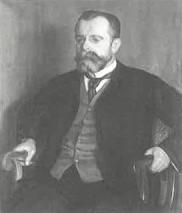Related Research Articles
Käte Hamburger was a Germanist, literary scholar and philosopher. She was a professor at the University of Stuttgart.

Historische Zeitschrift, is a German scholarly journal of history and historiography. Founded in 1859 it was the first and for a time the foremost historical journal in Europe. It is published by Akademie Verlag GmbH, a subsidiary of Oldenbourg Wissenschaftsverlag GmbH.
Imanuel Geiss was a German historian.
Hartmut Boockmann was a German historian, specializing in medieval history.

Jörn Leonhard is a historian and professor of Western European History at the History Department of the University of Freiburg since 2006. From 2007 to 2012, he was co-director of the School of History at the Freiburg Institute for Advanced Studies (FRIAS). His published works focus on the history of liberalism, nationalism, empires and wars. Leonhard has received several important research awards. His books “Die Büchse der Pandora” (2014) as well as “Der Überforderte Frieden” (2018) established him as an important representative in the research of global history.
Gerhard Albert Ritter was a German historian.

Rudolf Schieffer was a German historian specializing in medieval history. From 1994 to 2012 he was president of the Monumenta Germaniae Historica.

Rebekka Habermas was a German historian and professor of modern history at the University of Göttingen, in Germany. Habermas made substantial contributions to German social and cultural history of the 19th century.
Olaf Blaschke is a German historian. His research has focused on the modern and contemporary periods. Several of his more substantial publications have involved the Roman Catholic church.
Mario Keßler is a German historian.
Heide Wunder is a German historian.
Johannes Kunisch was a German historian. He held chairs of early modern history at the Goethe University Frankfurt. (1972-1976) and the University of Cologne (1976–2002). Through his publications Kunisch became one of the leading German early modern historians. His biography Frederick the Great, published in 2004 and widely acclaimed, gave lasting impulses to Prussian research.

Ludwig Schmugge is a German historian.
Hans-Christof Kraus is a German historian.
Peter Baumgart is a German historian.

Jens Hacke is a German political scientist and author.
Barbara Vogel is a German historian.

Ewald Grothe is a German historian. Since 2009 he has been an extraordinary professor at the Bergische Universität Wuppertal and since 2011 he has been head of the Archive of Liberalism of the Friedrich Naumann Foundation for Freedom in Gummersbach.

Erich Marcks was a German historian.
Hans Medick is a German historian.
References
- ↑ Cf. the reviews by Ernő Deák in: Mitteilungen des Instituts für Österreichische Geschichtsforschung 102 (1994), pp. 215–216; Grete Klingenstein in: Zeitschrift für historische Forschung 19 (1992), pp. 121–122.
- ↑ Wolf-Erich-Kellner-Gedächtnisstiftung: Laureates of the Wolf-Erich-Kellner-Prize. Archived 2018-10-03 at the Wayback Machine
- ↑ Barbara Vogel: Geschichtswissenschaft in Hamburg seit 1970. In Rainer Nicolaysen, Axel Schildt (ed.): 100 Years of Historical Studies in Hamburg (Hamburger Beiträge zur Wissenschaftsgeschichte. Vol. 18). Reimer, Berlin among others 2011, ISBN 978-3-496-02838-3, pp. 295–330, here p. 320.
- ↑ www.akgeschlechtergeschichte.de Archived 2015-03-04 at the Wayback Machine (retrieved 14 May 2021).
- ↑ University: Historian raises serious accusation against presidium. Must she go because she was too critical? Institute management disturbed by Sabine Todt's appearance on the TV programme "Monitor". Fakultät verteidigt Entscheidung. In Hamburger Abendblatt. 8. Mai 2007 (online available on google).